3 Leading International Efforts to Addressing Increasingly Complex and Serious Global Issues
(1) Climate Change and the Environment
Global environmental issues, including climate change are addressed in the Sustainable Development Goals (SDGs), and in the wake of extreme weather events and devastating natural disasters in recent years, they are critical and time-sensitive issues that the international community must work together on. The Leaders’ Communiqué of the G7 Hiroshima Summit, held under Japan’s Presidency in 2023, also noted climate change, biodiversity loss, and pollution as the triple global crisis facing our planet. Japan has vigorously worked on addressing these issues and provided assistance to developing countries, as one of the top donors, through the Global Environment Facility (GEF),Glossary a financing mechanism for major multilateral environmental agreements such as the Convention on Biological Diversity (CBD) and the United Nations Framework Convention on Climate Change (UNFCCC).
● Japan’s Efforts
■ Climate Change
The issue of climate change is a threat to the sustainable development of all countries in the world and a security issue that concerns the very existence of humankind. All countries must work together to address this issue, which requires increased concerted efforts by the international community, including not only developed countries but also developing countries. The Paris Agreement was adopted at the 21st Session of the Conference of the Parties to the UNFCCC (COP21) held in 2015, as a framework under which all countries would work toward greenhouse gas (GHG) emission reductions. The Paris Agreement entered into force in 2016.
In October 2020, Japan declared that it would achieve net-zero GHG emissions by 2050. In April 2021, Japan also declared its aim to reduce its GHG emissions by 46% in FY2030 from its FY2013 levels, and to continue strenuous efforts in its challenge to meet the lofty goal of cutting its emissions by 50%. In October 2021, Japan submitted its “Nationally Determined Contribution (NDC)”Note 53 reflecting these goals, together with “The Long-term Strategy under the Paris Agreement” to the UN.
At the G7 Cornwall Summit in June 2021, Japan announced a total of 6.5 trillion yen in assistance from both public and private sources over five years from 2021 to 2025. Furthermore, at COP26 held in the same year, Japan announced that it would provide up to an additional 10 billion US dollars from both public and private sources, including by doubling the finance for adaptation to 1.6 trillion yen over the five years.
(COP28)
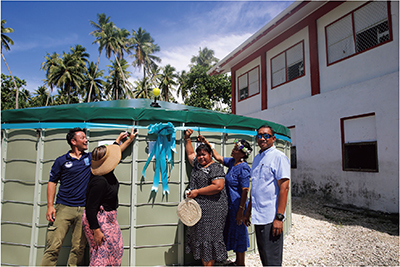
Japanese UNDP officer attending the commemoration ceremony of a locally assembled flatpack modular tank installed through the Addressing Climate Vulnerability in the Water Sector Project funded by the Green Climate Fund (GCF) in Majuro Atoll (Rongrong Island) in the Marshall Islands (Photo: UNDP)
COP28 was held in Dubai, United Arab Emirates, from November 30 to December 13, 2023. At COP28, decisions were adopted including on the first Global Stocktake, which assesses the world’s collective progress toward achieving the purpose of the Paris Agreement, including the 1.5°C goal,Note 54 and the operationalization of the new funding arrangements, including a fund for responding to loss and damage associated with the adverse effects of climate change. Additionally, Prime Minister Kishida participated in the “World Climate Action Summit,” held from December 1 to 2 during COP28, where he called for all countries to work together to achieve the common goal of net zero emissions through various pathways.
(Just Energy Transition Partnership (JETP))
The “Just Energy Transition Partnership (JETP),” which was launched at COP26 by France, Germany, the United Kingdom, the United States, and the EU to support South Africa, expanded its target countries to India, Indonesia, Viet Nam, and Senegal at the G7 Elmau Summit in June 2022. Japan, together with the United States, has proceeded discussions as a co-lead country of the Indonesia JETP. On November 15, 2022, partner countries, including Japan and the United States, and Indonesia concurred and issued the “Joint Statement on the Indonesia JETP,” which supports Indonesia’s efforts in the transition from coal to renewable energy. In addition, on December 14, 2022, the International Partners Group including Japan, and Viet Nam agreed on the “Political Declaration on establishing the JETP with Viet Nam.”
(Green Climate Fund (GCF))
Regarding multilateral support, Japan supports developing countries through its contribution to the Green Climate Fund (GCF),Glossary the world’s largest multilateral climate fund. Japan has contributed a total of up to approximately 319 billion yen to the fund to date. In addition, for the second replenishment period from 2024 to 2027, Japan has announced its intention to contribute up to 165 billion yen, the same amount as the first replenishment. At the GCF, a total of 243 projects have been approved and implemented by December 2023, which in total are expected to reduce GHG emissions by 3 billion tons and increase the resilience of 1 billion people through support for adaptation. Additionally, from Japan, JICA, MUFG Bank, Ltd., and Sumitomo Mitsui Banking Corporation are approved as “Accredited Entities” that are entitled to propose GCF projects. To date, three projects by MUFG Bank, Ltd. have been approved; a sustainable forestry project in seven countries in Sub-Saharan Africa and Latin America and the Caribbean (March 2020), an assistance on climate bond issuance project in developing countries (October 2022), and a blended finance project to support mitigation and adaptation in 19 countries in Asia, Africa, and Latin America and the Caribbean (October 2023), along with two projects by JICA; Community-based Landscape Management for Enhanced Climate Resilience and Reduction of Deforestation in Critical Watersheds in Timor-Leste (March 2021) and Building Climate Resilient and Safer Islands in the Maldives (July 2021).
(Bilateral Assistance)
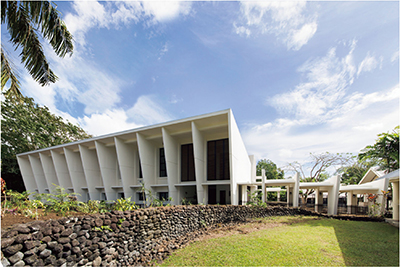
The Pacific Climate Change Centre, which Japan supported the construction of through grant aid in Samoa (Photo: JICA)
As a specific example of bilateral assistance, Japan dispatches experts on actions on climate change to the Pacific Climate Change Centre in Samoa, which Japan supported the construction of through grant aid. Through this Centre, Japan strives to develop human resources in the Pacific Island countries vulnerable to climate change. This support is expected to improve the capacity to properly predict weather disasters, which will widely benefit more than 10 million people in 14 Pacific Island countries. In addition, in cooperation with UNDP, Japan supports green transformation (GX) in Papua New Guinea, Samoa, Timor-Leste, and Vanuatu.
In relation to the African region, at TICAD 8 held in August 2022, Japan launched the “Green Growth Initiative with Africa (GGA)” with the goal of addressing climate change and transforming the energy structure toward decarbonization. Under this initiative, Japan aims to maximize its cooperation through three concepts; (i) ownership and co-creation, (ii) flexible finance mobilization, and (iii) collaboration with diverse partners, and promotes various efforts to contribute to the sustainable growth in Africa.
(“Asia Zero Emission Community (AZEC)” Initiative)
In his Policy Speech in 2022, Prime Minister Kishida announced the “Asia Zero Emission Community (AZEC)” concept as a platform to aim for decarbonization in Asia. In March 2023, Japan held the AZEC Ministerial Meeting with the invitation of ASEAN countries and Australia, and AZEC was launched as a cooperation framework. Prime Minister Kishida held the first AZEC Leaders Meeting in December, where the leaders shared the major goal of carbon neutrality while confirming that they would respect various pathways to achieving the goal and would simultaneously achieve decarbonization, economic growth, and energy security. He also emphasized that Japan would continue to contribute to achieving decarbonization in Asia and global sustainable growth together with partner countriesNote 55 through activities under the AZEC platform.
(Joint Crediting Mechanism (JCM))
As part of its assistance for climate change actions in developing countries, Japan promotes the “Joint Crediting Mechanism (JCM),”Glossary which facilitates the diffusion of advanced decarbonizing technologies to partner countries around the world including developing countries. This contributes to GHG emission reductions in partner countries, and helps Japan to achieve its own reduction targets as the emission reductions in developing countries can be credited as Japan’s reduction efforts. In 2013, Japan signed the first Memorandum of Cooperation (MOC) on the implementation of the JCM with Mongolia. Since then, by 2022, Japan has established the JCM with 25 countries, and in 2023, it signed new MOCs with three countries. As of the end of 2023, the JCM credits have been issued from 68 energy-saving and renewable energy projects in Cambodia, Indonesia, Laos, Mongolia, Thailand, Viet Nam, Bangladesh, Maldives, Palau, Saudi Arabia, and Kenya. These JCM projects contribute to GHG emission reductions worldwide.
Japan will continue to lead the international community toward the realization of a decarbonized society, which is the goal of the Paris Agreement.
■ Mainstreaming Biodiversity
In recent years, expansion of human activities in scope, scale, and types has given rise to serious concerns about further degradation of habitats and the destruction of the ecosystem. Japan values biodiversity efforts, as seen in its initiative to hold the 10th meeting of the Conference of the Parties to the Convention on Biological Diversity (CBD)Glossary (COP10) in Nagoya City, Aichi Prefecture in 2010. In addition, Japan makes contributions to the Japan Biodiversity FundNote 56 to support the capacity building of developing countries. In December 2022, the second part of the 15th Meeting of the Conference of the Parties (COP15) was held in Montreal, Canada, and the “Kunming-Montreal Global Biodiversity Framework” was adopted as the new global goals and targets. Japan will continue to contribute in this field, aiming to realize the 2030 mission that is “to take urgent action to halt and reverse biodiversity loss to put nature on a path to recovery” and the 2050 Vision of “living in harmony with nature,” described in the framework. In light of the results of COP15, the Parties are requested revise or update their National Biodiversity Strategies and Action Plans (NBSAPs). Japan is one of the first countries to begin considering updating its NBSAP, and in March 2023, the Cabinet decided on the “National Biodiversity Strategy 2023-2030.”
Illegal trade of wildlife has also become an increasingly serious issue. The international community pays attention to this issue, as it has been one of the funding sources of international terrorist organizations. Japan has been actively contributing to the discussions at the Convention on International Trade in Endangered Species of Wild Fauna and Flora (CITES), and has been working on resolving the issue in cooperation with the international community through the contribution to projects implemented by the CITES Secretariat. As a specific initiative, Japan supports the construction of facilities and other measures to combat elephant poaching, mainly in Africa.
■ Conservation of the Marine Environment
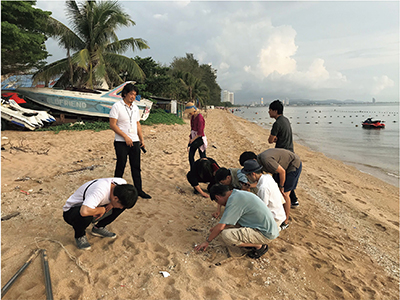
Inspecting the coastline of the Gulf of Thailand under the technical cooperation, the “Project for Formation of a Center of Excellence for Marine Plastic Pollution Studies in the Southeast Asian Seas” in Thailand (Photo: JICA)
The importance of addressing the problem of marine plastic litter has grown in recent years as an urgent challenge, with concerns of an adverse impact on the marine ecosystem, tourism, fisheries, and human health. As of December 2023, 87 countries and regions have shared the “Osaka Blue Ocean Vision,” an initiative led by Japan at the G20 Osaka Summit in 2019 that aims to reduce additional pollution by marine plastic litter to zero by 2050. In order to realize the Vision, Japan launched the “MARINE Initiative” that focuses on (i) Management of wastes, (ii) Recovery of marine litter, (iii) Innovation, and (iv) Empowerment. Under the Initiative, Japan supports capacity building and infrastructure development for waste management in developing countries in order to promote effective measures against marine plastic litter worldwide.
In September 2023, Foreign Minister Kamikawa attended the Fifth Meeting of the High-Level Panel for a Sustainable Ocean Economy and stated that Japan would promote its excellent efforts, such as those related to blue carbon,Note 57 as the “Japanese Model” and that Japan hoped to share with many other countries the ambition to reduce additional plastic pollution to zero by 2040, which was committed at the G7 Hiroshima Summit in May (see Part I, Section 2 for details). She also stated that Japan would continue to be actively involved in the negotiations in the Intergovernmental Negotiating Committee process to develop a legally binding international instrument (a treaty) on plastic pollution in order to realize an effective and progressive treaty in which many countries would participate.
Japan supports countermeasures against marine plastic litter in the field of marine environmental conservation. As part of technical cooperation, such as dispatching experts to developing countries and accepting trainees from developing countries through JICA, in 2023 Japan implemented a Knowledge Co-Creation Program for Group and Region Focus “Waste Management towards Control of Marine Litter.”
As part of expanded assistance for ASEAN to address marine plastic litter issues, which was announced at the ASEAN-Japan Summit in 2018, Japan provides capacity building support and conducts awareness-raising and PR activities for environmental conservation, primarily on reducing marine plastic litter in ASEAN countries since 2019. In 2023, through the Japan-ASEAN Integration Fund (JAIF),Note 58 Japan provided assistance to strengthen capacity for marine debris reduction through the formulation of national action plans in ASEAN countries and to promote a plastic circular society in the ASEAN region. In addition, Japan also provided support to strengthen capacity development of local governments in ASEAN countries to tackle microplastics and water pollution, and to build capacity for monitoring and reducing marine debris from fisheries.
Japan supports marine plastic litter countermeasures through the UN Environment Programme (UNEP) especially in Southeast Asia, South Asia, and Pacific Island countries. In response to the worsening marine pollution caused by plastic waste, starting in 2018, UNEP developed a method for monitoring the flow of plastic waste into the ocean. In addition, to enable science-based policymaking, UNEP conducts sampling surveys of plastic litter and scientific analysis on its pathways and formulates policy recommendations and guidelines based on the results. Furthermore, in collaboration with a Japanese IT company, a plastic leakage hotspot map was created, identifying over 3,000 leakage points (hotspots), and released on a dedicated websiteNote 59 available to the general public.
■ Protection of Forests and Water Resources
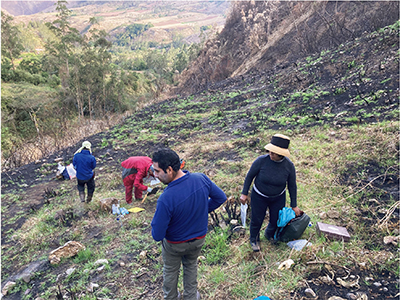
Soil surveys in areas affected by forest fires in Peru under the “Project for Establishment of Integrated Forest Management System Model for Conservation of Mountain Forest Ecosystems in the Andean-Amazon” (Photo: MIYAMOTO Kazuki)
Among forest resources, tropical forests account for approximately half of the world’s forests and play an important role in tackling climate change and conserving biodiversity. Japan invited the International Tropical Timber Organization (ITTO) to establish its headquarters in Yokohama, and has supported sustainable management of tropical forests as well as legal and sustainable tropical timber trade through the organization for more than 30 years. Through voluntary contributions to ITTO, the Government of Japan provides support for tropical timber-producing countries, such as conducting on-site testing in Panama in 2023 for the introduction of technology owned by the Forestry and Forest Products Research Institute of Japan to identify the geographic origin of timber.
Regarding the conservation of marine living resources, Japan conducts training and workshops on countermeasures against illegal, unreported, and unregulated (IUU) fishing in the ASEAN region through JICA in cooperation with the Southeast Asian Fisheries Development Center (SEAFDEC). Curbing the impact on fish ecosystems affected by IUU fishing that exceeds regulatory thresholds leads to supporting the sustainability of the fishing industry, one of the core industries for ASEAN countries, and the sustainable development of fishing communities.
■ Environmental Pollution Control Measures
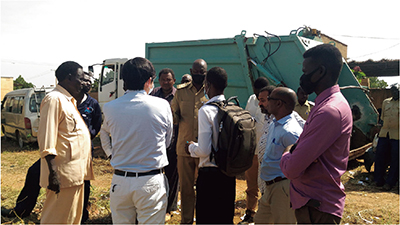
Inspection of the operation status of waste collection vehicles under the technical cooperation “Clean Cities Project in Sudan” (Photo: Yachiyo Engineering Co., Ltd.)
In developing countries, regulatory controls on hazardous chemical materials are often not in place, which sometimes lead to environmental pollution and health damage. Japan possesses accumulated knowledge, experience, and technology related to environmental pollution control measures and utilizes them to solve environmental pollution problems in developing countries. Japan also conducts technical cooperation, such as dispatching experts to and accepting trainees from developing countries, in the areas of environmental management techniques in the chemical industry, analysis techniques and risk evaluation for environmentally hazardous substances, and chemical trace analysis techniques.
The “Minamata Convention on Mercury” was adopted at the Conference of Plenipotentiaries on the Minamata Convention on Mercury (2013) and entered into force in August 2017. Japan exercises continuous leadership in promoting the management of global mercury pollution by proactively transferring to the world its technology and know-how on preventing adverse effects caused by mercury, accumulated through its experience with the Minamata disease. In addition to conducting training to support Nepal and other countries in ratifying the convention, Japan conducted surveys in Indonesia and other countries to promote the international expansion of Japan’s excellent mercury management technology. Furthermore, from 2019, the UNEP Regional Office for Asia and the Pacific (UNEP/ROAP) as an implementing agency has been conducting the “Project for Promoting Minamata Convention on Mercury by making the most of Japan’s knowledge and experiences,” with Japan’s contribution. Through this project, Japan supports member states in improving the quantity and quality of domestic mercury-related information and developing a platform to implement mercury management in line with the Convention. The project utilizes the resources in and around Minamata City and technology possessed by Japanese institutions to design a comprehensive program to strengthen implementation capacity.
In the field of waste management, based on the “MARINE Initiative,” Japan announced to develop 10,000 officials engaging in waste management around the world by 2025 and trained approximately 20,000 officials by FY2022 through various means such as training programs.
Moreover, as a model project for waste management support in Africa under the “African Clean Cities Platform (ACCP),”Glossary Japan provides support for the Hulene final landfill site in Mozambique. At TICAD 8 held in August 2022, Japan announced that, under the ACCP, it would promote decarbonization and recycling in the waste sector, and improve public health including through waste management that benefits 30 million people in Africa, as well as to implement human resources development for 1,000 people. In Antananarivo, the capital city of Madagascar, a project is underway to improve equipment related to the collection, transportation, and final disposal of waste, with the aim of enhancing the city’s waste management capacity (see “Master Techniques from Japan to the World” for waste management support utilizing the Fukuoka Method in Ethiopia).
Glossary
- Global Environment Facility (GEF)
- A multilateral funding mechanism providing primarily grant-based financing for projects that contribute to global environmental conservation in developing countries. Having been established in 1991, 186 countries including Japan participate (as of December 2023). The World Bank manages the contributions from member countries. Through 18 implementing agencies including MDBs (World Bank, ADB, etc.) and UN organizations (UNDP, UNEP, etc.), it assists developing countries under five focal areas, namely biodiversity loss, climate change, international waters, land degradation, and chemicals and waste. It is designated as the financing mechanism to the UNFCCC, CBD, UN Convention to Combat Desertification (UNCCD), Stockholm Convention on Persistent Organic Pollutants, Minamata Convention on Mercury, and the Agreement under the United Nations Convention on the Law of the Sea on the Conservation and Sustainable Use of Marine Biological Diversity of Areas Beyond National Jurisdiction (BBNJ Agreement).
- Green Climate Fund (GCF)
- A multilateral climate fund established by the decision of COP16 (Cancun Agreement) in 2010, in order to support developing countries in reducing their GHGs (mitigation) and in their responses to the effects of climate change (adaptation).
- Joint Crediting Mechanism (JCM)
- A mechanism to evaluate contributions from Japan to GHG emission reductions or removals realized through the diffusion or implementation of leading decarbonizing technologies, products, systems, services, and infrastructure, etc., mainly in developing countries in a quantitative manner, and to use the contributions to achieve Japan’s NDC.
- Convention on Biological Diversity (CBD)
- A convention adopted in 1992 to advance global efforts to address biodiversity issues. The objectives of CBD are the following: (i) conservation of biological diversity, (ii) sustainable use of the components of biological diversity (utilizing living resources for the future while maintaining diversity at each level of ecosystems, species, and genes), and (iii) fair and equitable sharing of the benefits arising out of the utilization of genetic resources. Through the provision of economic and technical assistance to developing countries from developed countries, the international community as a whole facilitates the conservation and sustainable use of biological diversity worldwide.
- African Clean Cities Platform (ACCP)
- Established in 2017 by the Ministry of the Environment, Japan, together with JICA, the City of Yokohama, UNEP, and the UN Human Settlements Programme (UN-Habitat) aiming to share knowledge on waste management and promote the achievement of the SDGs in Africa. 173 cities in 46 countries in Africa have joined the Platform, holding plenary sessions, creating various guidelines and educational materials, planning study tours, and more.
- Note 53: Parties set their GHG emission reduction targets and formulate measures to achieve them as National Determined Contribution (NDC). It will then be submitted to the UNFCCC secretariat.
- Note 54: A goal set to limit the global average temperature rise to 1.5°C above the pre-industrial level.
- Note 55: AZEC partner countries are Australia, Brunei, Cambodia, Indonesia, Japan, Laos, Malaysia, the Philippines, Singapore, Thailand, Viet Nam.
- Note 56: Established in the Secretariat of the CBD by Japan during its COP10 Presidency with the aim of building capacities in developing countries.
- Note 57: Carbon that is captured by living organisms in coastal and ocean ecosystems, accumulates in the soil, and sinks to the seafloor.
- Note 58: See Note 4.
- Note 59: “Mobile Application for Macro Plastic Survey” https://arcg.is/1DOOWW
